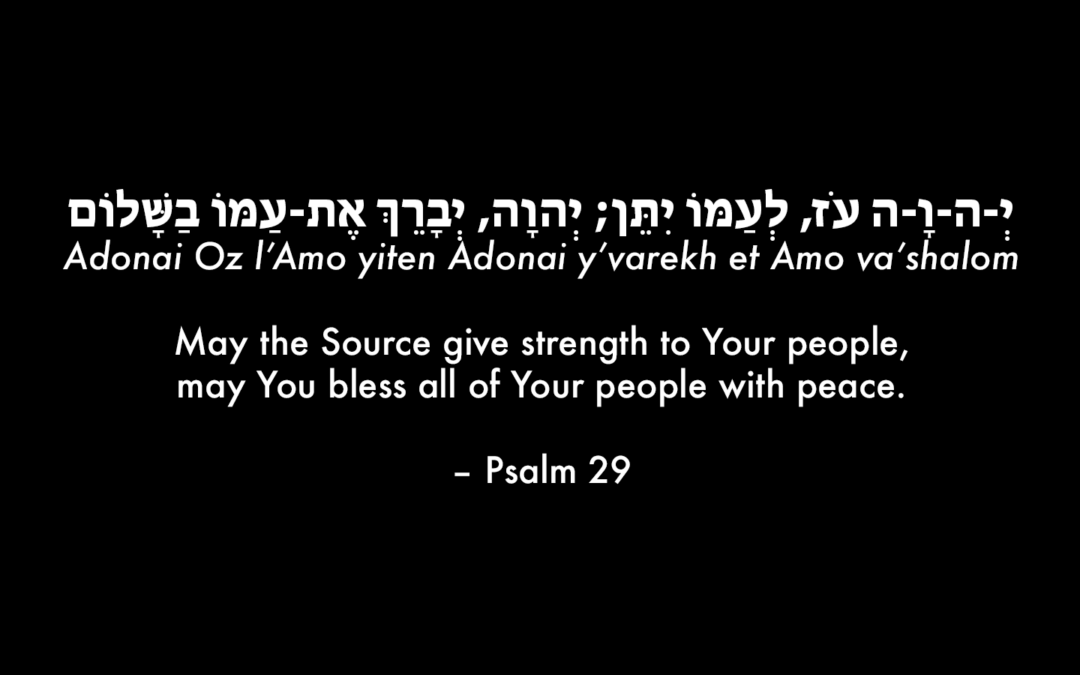יְ-ה-וָ-ה עֹז, לְעַמּוֹ יִתֵּן; יְהוָה, יְבָרֵךְ אֶת-עַמּוֹ בַשָּׁלוֹם.
Adonai Oz l’Amo yiten Adonai y’varekh et Amo va’shalom
May the Source give strength to Your people,
may You bless all of Your people with peace.
– Psalm 29
To the Mishkan community,
We are all watching with broken hearts the horrific news out of Israel this weekend. At Shabbat morning yesterday, while leading Hallel, the series of joyfully sung psalms we sing on festivals, there was the palpable air of cognitive dissonance in the room, alongside tears: how can we sing joyful songs when our brothers, sisters, cousins, children, and parents, are under rocket fire and being terrorized, kidnapped, and murdered in the streets by masked gunmen, in a horrific situation unfolding as we sing? By the afternoon, the numbers of casualties and people injured were in the thousands, Netanyahu had declared war on Hamas, and we were all bracing for what comes next, and to understand the full extent of the loss and damage. We condemn these attacks unequivocally.
As of this very moment, everyone who calls Israel, the West Bank and Gaza home, is living with uncertainty and fear. Over 600 Israelis have been murdered – including, of course, Jewish and Palestinian Israelis – and the number is still rising. An unknown number of innocent civilians have been kidnapped. We’re getting WhatsApp messages from friends in Israel whose family members have been murdered and/or kidnapped. Our brothers and sisters are living through a nightmare that we pray will be over as soon as humanly possible.
This surprise attack occurred 50 years to the day after the Yom Kippur War, in which Israel faced an attack from neighboring Arab armies, and the occurrence of this latest attack by Hamas on Simhat Torah feels painfully reminiscent. The Israeli protest movement, about which I spoke on Rosh Hashanah, is suspending protests against the government while the country comes together to both mourn and defend itself.
A particular line from Hallel can help us face this moment. Min HaMetsar karati Yah anani b’merhav Yah: “From the narrow place I called out and You answered me with great expansiveness.” (Psalm 118) We pray that those in power can restore peace and safety for everyone who calls Israel, the West Bank and Gaza home, knowing that a lasting and sustained peace cannot come at the safety or well-being of anyone else, lest the cycle of violence continue forever, God forbid. Let us, and let Israel’s leaders remember that the enemy is not Palestinians, but the zero-sum ideology of hate and revenge that motivated Hamas to commit these horrific acts.
To quote my friend and teacher, Jerusalem-based Israeli Leah Solomon, “Hamas, in its choice to try to murder me, my family, and our fellow Jewish Israelis, has positioned itself as the enemy – not only my enemy but the enemy of all who want a better future here in this land, including Palestinians. They are, and are destined to be, our fellow inhabitants of this land, and they are our present and future partners in building a future of long term security, justice, dignity, equality, and freedom for all who live here. We are all here to stay. We should start acting like it.”
I pray that Jews and Israelis – justifiably hurt, angry, violated and traumatized, resist calls for revenge, and I pray that Israel’s and Palestine’s leaders be imbued with merhav Yah, an expansive vision, that enables them to see one another as neighbors destined to share the same land, all of whom deserve to live in peace, freedom, and safety.
While it feels impossible to marshal an ounce of any emotion other than anxiety, anger and sadness for this moment, Jewish tradition demands that we widen our scope and do something proactive, something that helps us remember that we are not powerless to help. We can stand in solidarity with victims of terror and violence, and can send support. There are links below for how to do both, and how to learn more about what’s happening.
We are here for you, please don’t hesitate to reach out if we can support you.
Sending blessings for peace, comfort, and solidarity.
– Rabbi Lizzi Heydemann and Rabbi Steven Philp

